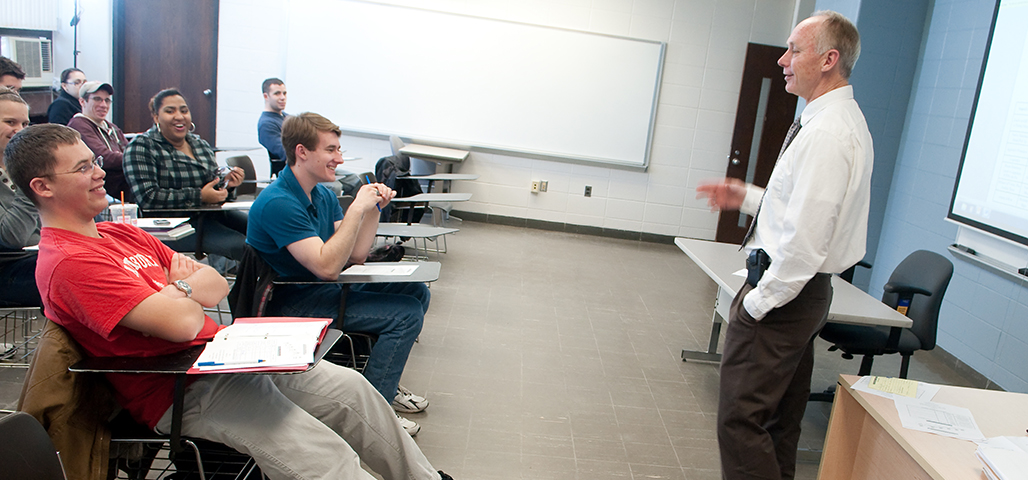Criminal Justice Associate Degree
Help Keep Your Community Safe with an Associate Degree in Criminal Justice from NECC

Why Pursue a Criminal Justice Associate Degree?
Are you interested in a career serving the public in the criminal justice system? Would you like to maximize your education spend while pursuing a bachelor’s degree in Criminal Justice or a related field? If so, NECC’s Criminal Justice Associate Degree program is tailor-made for you.
Make a Difference, Protect Our Society
Available through various learning formats, NECC’s Associate of Science in Criminal Justice program provides a solid foundation in criminology, law enforcement, and the justice system. Students also learn about the social issues shaping criminal justice as they prepare for an exciting career in law enforcement, security, or a related field.
What You’ll Get from Our Criminal Justice Program
Explore Many Paths to Career Success
At NECC, our intensive Criminal Justice program offers a broad academic orientation, exposing you to the U.S. court and corrections systems, law enforcement and security, and counter-terrorism—a rapidly-growing career area. Our program will equip you with the skills and knowledge necessary to pursue a variety of entry-level private and government security positions.
Once completed, students can also apply credits earned towards a bachelor’s degree in Criminal Justice or a related field at a four-year college or university, saving thousands of dollars off their education!
Do Cool Stuff, Not Just Homework
Forget about endless lectures. We’re talking about interactive classes and workshops where you practice what you’ve learned in real-life scenarios, as well as projects that connect you with your community.
You might choose a career in community policing. The NECC Police Academy is authorized by Municipal Police Training Committee (MPTC).
Gear Up for a Great Career in the Criminal Justice Field
 At NECC, we’re here to help you build a skill set that’s in high demand. Whether you see yourself as a municipal police officer, a private detective, an insurance investigator, or anything in-between, we’ve got you covered. While guiding you every step of the way, our experienced instructors will show you how to:
At NECC, we’re here to help you build a skill set that’s in high demand. Whether you see yourself as a municipal police officer, a private detective, an insurance investigator, or anything in-between, we’ve got you covered. While guiding you every step of the way, our experienced instructors will show you how to:
- Gain a solid understanding of the various aspects of the Criminal Justice system
- Benefit from instruction in psychology, sociology, and criminology
- Gain real-world experience through internships
- Enjoy access to clubs and organizations for NECC students
- Take advantage of MassTransfer and other transfer pathways, saving thousands of dollars on your bachelor’s degree in Criminal Justice or a related field
Your Schedule, Your Rules
Juggling life, work, and study? No sweat. With a mix of online and on-campus options, NECC makes it easy for you to fit study into your life, not the other way around.
Quote:
An internship in the Lawrence Probation Department confirmed that she had made the right career choice—“I loved it.”
Josiery Santos, Criminal Justice
Where This Journey Can Take You
 An associate degree in criminal justice offers much potential for growth. In some ways, starting out with an associate degree is an advantage – you can begin working in the field and before investing additional time and money obtaining a bachelor’s degree.
An associate degree in criminal justice offers much potential for growth. In some ways, starting out with an associate degree is an advantage – you can begin working in the field and before investing additional time and money obtaining a bachelor’s degree.
Imagine yourself serving in one of these roles:
- Municipal Police Officer
- State Trooper
- Correctional Officer
- Federal Agent
- Insurance Investigator
- Public or Private Detective
- Forensic Science Technician
- Probation Officer or Correctional Treatment Specialist
- Court System Employee
- Many more!
Why Choose NECC for Your Criminal Justice Degree?
We Get It
At NECC, inspiring our students to succeed is our top priority. Modern, relevant, and engaging, our Criminal Justice courses are designed with you in mind.
NECC’s dedicated faculty and staff help students develop the skills they need to advance in the workforce or transfer to a four-year college or university. Our small class sizes ensure personalized attention and support, empowering students to thrive academically. We also offer a variety of student support services, including tutoring, counseling, and academic advising.
With over 60 credit programs, two convenient campuses, robust student support services, and a vibrant student life, NECC is committed to providing an affordable, accessible, and high-quality education for all.
Learn from the Pros
Our instructors aren’t just teachers. They’re experienced professionals and LEOs who live and breathe Criminal Justice.
Experience Beyond the Classroom
At NECC, it’s not just about earning a degree. It’s about building a network, finding your tribe, and acquiring the tools necessary to chase your dreams. Our Haverhill and Lawrence campuses are home to a diverse range of clubs and organizations and activities that help students connect with peers who share similar interests.
Whether you choose to gain leadership experience, stay healthy and fit, join a club, or participate in varsity sports, and student activities, we’ll guarantee you’ll have fond memories of your time at NECC.
We Got Your Back
From the day you start until the day you land your first big gig, our team is here to support, guide, and cheer you on. At NECC, our goal is to empower our students by equipping them with the skills and tools necessary to thrive, wherever they choose to work.
Career Services
Navigate
What Can I Do With This Major?
Got Prior Learning or Work Experience?
With NECC’s Credit for Prior Learning, you can move through the program at a faster pace, and graduate sooner! The best part is these credits are covered free-of-charge for eligible Massachusetts learners.
Support for Every Student
NECC offers a variety of student support services, including tutoring, counseling, and academic advising, to help students thrive academically. Want to transfer to NECC? Our advisors are happy to assist you.
Career Outlook for Criminal Justice Professionals In Massachusetts
According to the US Bureau of Labor Statistics (BLS), employment opportunities for Criminal Justice professionals are expected to increase over the next eight years. For example, BLS projects a 3% increase in jobs for police officers and detectives nationally due to growing demand. At NECC, our Criminal Justice program graduates have an exceptional rate of employment while working in various settings, including those in the public, private, and government sectors.
How Much Can I Expect to Make While Working in the Criminal Justice Field?
The earning potential for those employed in Criminal Justice occupations varies based on several factors, including education, location, experience, role, and setting. For example, according to Salary.com, the median annual wage for a municipal police officer in Boston, MA, was $72,400 as of July, 2024.
With a Criminal Justice Associate’s Degree from NECC, you’ll be qualified to pursue or advance your career in these roles:
Municipal Police Officer
Responsible for upholding the laws of their jurisdiction and serving and protecting the citizens of their city. The median annual wage in Boston, MA, for this role was $72,400 as of July, 2024. The wage range typically falls between $67,600 and $78,800.¹
State Trooper
Responsibilities include enforcing traffic and criminal laws on state-regulated highways, responding to emergencies involving motorists, and assisting with detours and evacuations. The median annual wage in Massachusetts for this role was $69,174 as of July, 2024. The wage range typically falls between $64,227 and $74,767.¹
Correctional Officer
Work in jails, prisons, and other facilities to maintain order and security, and to ensure the safety of people in custody. The median annual wage in Massachusetts for this role was $55,026 as of July, 2024. The wage range typically falls between $48,997 and $61,066.¹
Federal Agent (FBI)
Enforce Federal laws, investigate crimes, collect and preserve evidence, write reports for government prosecutors, apprehend criminals, and testify in court. The median annual wage in the United States for this role was $56,306 as of July, 2024. The wage range typically falls between $40,997 and $76,623.¹
Insurance Investigator
Examine insurance claims to ensure they are valid and not fraudulent. They may also investigate to establish the circumstances of a claim. The median annual wage in Boston, MA, for this role was $64,904 as of July, 2024. The wage range typically falls between $58,606 and $73,021.¹
Private Detective
Gather, analyze, and report information for clients on a variety of personal, financial, and legal matters. The median annual wage in Massachusetts for this role was $56,001 as of July, 2024. The wage range typically falls between $45,301 and $67,701.¹
Forensic Science Technician
Collect, identify, classify, and analyze physical evidence related to criminal investigations. May be asked to testify as expert witnesses on evidence or crime laboratory techniques. The median annual wage in Massachusetts for this role was $70,727 as of July, 2024. The wage range typically falls between $63,298 and $83,120.¹
Probation Officer
Assess the needs and risks of probationers and develop personalized supervision plans. Regular monitoring, often involving drug testing and home visits, ensures compliance with probation terms. The median annual wage in Massachusetts for this role was $70,496 as of July, 2024. The wage range typically falls between $62,802 and $78,428.¹
Court System Employee (Clerk)
Support judges by helping to resolve disputes or cases. Responsibilities may include calling the calendar, preparing written correspondence, maintaining custody of physical evidence, and preparing and examining court documents. The median annual wage in Massachusetts for this role was $47,083 as of July, 2024. The wage range typically falls between $42,331 and $55,170.¹
How to Get Started in the Criminal Justice Field North of Boston
Feeling pumped? We thought so! Learn more about how to apply for the Criminal Justice Associate Degree program.
FAQs
Sources and Citations: ¹Salary information provided on this page is sourced from Salary.com. The data reflects estimates based on employer surveys and job listings. Actual salaries may vary based on location, experience, and other factors.






